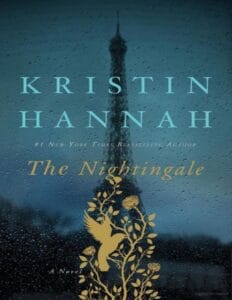The Nightingale by Kristin Hannah: Fact-checked WWII France trivia and history from the book
- Updated: October 13, 2025
- Gloria
Table of Contents
I pulled together bite-size trivia that the book references and paired each one with the real-world history. I must give hats off to Kristin Hannah for a well-researched book!
Everything here is fact checked, and easy to skim. If you like this format, you might also enjoy my guide to The Nightingale by Kristin Hannah, which pairs nicely with these history notes for readers who want more context. you can also browse our Reading Guides and Historical Fiction pages for more.
Edward Grey's quote “the lights are going out all over Europe”
In the book: The saying, “The lights are going out all over Europe; We shall not see them lit again in our lifetime,” is attributed to Sir Edward Grey, speaking about World War I
History: Britain’s foreign secretary Sir Edward Grey, said this on 3 August 1914 while Britain stood on the edge of World War I. The line appears in his memoir and in contemporary accounts.
Maginot Line and the 1940 invasion of France
In the book: People talk about France’s concrete fortifications, then learn the line did not keep Germany out.
History: This elaborate system of fortifications built by France in the 1930s was designed to prevent a German invasion. In World War II, it proved largely ineffective as German forces famously bypassed it by invading through Belgium and the Ardennes forest.
Drôle de guerre, the Phony War 1939–1940
In the book: Teachers mention months of waiting with little fighting after war is declared.
History: The “Phony War” ran from September 1939 to May 1940, with little ground fighting on the Western Front, even though France and Britain were at war with Germany
The Louvre evacuation of art in 1939–1940
In the book: It’s mentioned that much of the Louvre’s collection was emptied, and fake paintings were put in place.
History: Before the German occupation of Paris, the Louvre embarked on a massive evacuation of its art, headed by Louvre staff Jacques Jaujard, meticulously hiding countless masterpieces in various secret locations across France to protect them from wartime damage or seizure.
Edith Cavell’s last words and legacy
In the book: Edith Cavell is portrayed as a World War I nurse, executed by the Germans, and quoted as saying “patriotism is not enough.”
History: British nurse Edith Cavell was executed in 1915 for aiding Allied soldiers in Belgium. Her actual full quote, often paraphrased, was, “Patriotism is not enough. I must have no hatred or bitterness towards anyone.”
Gestapo in occupied France
In the book: Introduced as the “Geheime Staatspolizei” or “Gestapo,” they are depicted as a formidable secret police force.
History: The Gestapo was indeed the official secret police of Nazi Germany and its occupied territories. It gained a reputation for its ruthless methods, surveillance, and suppression of opposition.
Division of France, occupied zone and Vichy France
In the book: France is split into an occupied area and a so-called free zone, then fully taken over.
History: After the June 1940 armistice, the north and west were under German rule while the south became Vichy France. Germany and Italy occupied the rest in November 1942.
Philippe Pétain’s leadership of Vichy France
In the book: Pétain is introduced as a World War I hero who, as France’s leader, chose surrender to protect the nation, but is seen to be collaborating with the Nazis.
History: Philippe Pétain was indeed a highly decorated World War I general. He became head of state of Vichy France, actively collaborating with Nazi Germany, which included implementing discriminatory laws and assisting in the Holocaust. He was later convicted of treason.
General Charles de Gaulle’s “Appeal of 18 June 1940”
In the book: De Gaulle’s voice is heard declaring, “Whatever happens, the flame of French resistance must not and shall not die.”
History: Charles de Gaulle was a French general and statesman who established the Free French Forces in London after France’s surrender. His famous “Appeal of 18 June 1940” broadcast on the BBC urged French citizens to continue resisting the occupation.
Groups targeted by Nazi policy in France
In the book: Posters declare that French people arrested for any infraction will be considered “hostages,” and if a hostile act occurs against Germany, these hostages will be shot.
History: The Nazi regime systematically persecuted and sought to exterminate various groups deemed “undesirable” or “enemies of the state,” including Jews, Roma (Gypsies), political dissidents, homosexuals, disabled individuals, and Jehovah’s Witnesses.
Musée de l’Homme Resistance network in Paris
In the book: It was a group tied to the museum prints and spreads clandestine tracts.
History: The Musée de l’Homme (Museum of Man) in Paris housed one of the earliest and most notable French Resistance networks, formed in 1940. This group published an underground newspaper to counter German propaganda.
Britain's MI9
In the book: MI9 provides money, forged papers and planning for escape routes.
History: MI9 was a highly secretive department of British military intelligence during World War II. Its primary mission was to aid Allied servicemen, particularly downed airmen, in escaping or evading capture in enemy territory, often by working with local Resistance networks.
Pyrenees Escape Routes
In the book: The Nightingale network utilizes the Pyrenees mountains to transport downed Allied airmen from France into Spain
History: During World War II, numerous clandestine escape routes, often called “lines,” traversed the Pyrenees. These perilous paths were used by thousands of downed Allied airmen, Jews, and Resistance members seeking refuge or passage to Allied nations via neutral Spain.
The Vel d'Hiv Roundup, July 1942
In the book: Police arrest foreign-born Jews and send families to the Vélodrome d’Hiver.
History: On 16–17 July 1942, French police detained more than 13,000 jews, including many children in Paris. Most were sent through Drancy and deported to Auschwitz.
BBC Coded Messages for the Resistance
In the book: Phrases like “Long sobs of autumn violins” are received over the BBC radio as codes.
History: The BBC broadcast used seemingly innocuous but pre-arranged coded messages as part of its French-language programming to signal Resistance groups in occupied France to prepare for or initiate specific operations.
The OSE (Œuvre de Secours aux Enfants)
In the book: Referred to as the “Help the Children Fund,” working to aid and reunite Jewish children.
History: OSE was a prominent French Jewish humanitarian organization. During World War II, its clandestine network played a vital role in rescuing and hiding thousands of Jewish children from the Holocaust in France.
Liberation of Auschwitz, January 1945
In the book: People hear that Auschwitz has been freed.
History: The Auschwitz concentration camp complex, the largest Nazi extermination camp, was liberated by the Soviet Red Army on January 27, 1945.
If you loved these facts and want more like these from other historical fiction books, we have created Comprehensive Book Club Guide Kits for various must-read book club books. These guides provide everything you need to host a lively and engaging book club meeting, including:
- Thought-provoking discussion questions in printable PDF format that will help you explore the novel’s themes.
- Fun icebreaker questions to get your discussion started.
- Challenging word search puzzles based on the novel’s characters and events.
- Delicious food and drink ideas inspired by the novel.
- Insightful book quotes with explanations to help you understand the novel’s deeper meaning.
- Meeting record templates to take notes and keep track of your discussions, and so much more!
These guides are perfect for book clubs of all sizes and experience levels. They are also a great resource for individual readers who want to deepen their understanding of the novels.
Kristin Hannah Biography
Kristin Hannah is a bestselling American author, known for her compelling and emotionally charged historical fiction novels. Her dedication to her craft and her ability to create complex, relatable characters have earned her a devoted following and numerous accolades throughout her career.
Hannah’s writing often explores themes of love, loss, friendship, and resilience, with a particular focus on the experiences of women throughout history. Her novels, such as The Women, and The Great Alone, have been praised for their meticulous research, vivid prose, and emotional depth, transporting readers to different eras and places while shining a light on the untold stories of remarkable women.
Was this post helpful?
We’d love to hear from you : )
Wondering What to Read Next?
Discover your next book read tailored to suit you! No more long book recommendation quizzes that make your eyes go dizzy.
Our book recommendation engine knows exactly what book will captivate you next.
Simply tell us what you’ve loved reading, and well unveil a perfect match for your reading pleasure.
You will absolutely love it




